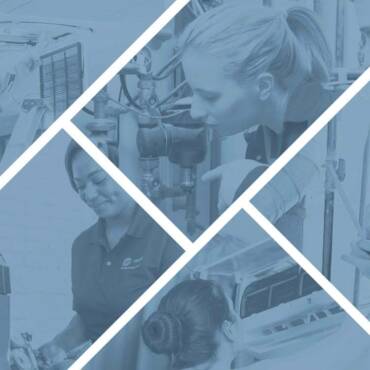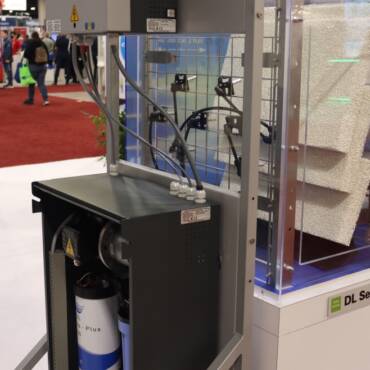Meanwhile, as governments and private companies invest heavily in infrastructure, sectors such as healthcare, education, and public administration are expected to increase their demand for modern HVAC systems. Taking advantage of opportunities related to these large-scale projects can raise your company’s valuation, as long as you are smart about growth and remain focused on quality and profitability. Commercial HVAC businesses that serve a diverse range of industries can further benefit from greater stability and value. Diversifying across sectors helps mitigate the risks of economic downturns in specific industries, providing steady income from various sources while adding variety to your customer concentration.
As sustainability becomes a greater priority for many businesses, HVAC companies that offer green solutions—such as energy-efficient retrofits or systems qualifying for Leadership in Energy and Environmental Design (LEED) certification—are in high demand. Helping your clients achieve energy savings and sustainability goals will position you to thrive in the evolving market.
2. Revenue Streams. A diversified revenue model is essential for the success of your commercial HVAC company, with several key streams contributing to financial stability and long-term growth. Long-term maintenance agreements, for one, are crucial for commercial HVAC businesses because they provide dependable, recurring revenue. These contracts also can make your company more attractive to buyers or investors seeking stable cash flow.
Does your commercial HVAC firm balance revenue between new construction projects and replacement or retrofit work? While new construction can be lucrative and, in fact, accounts for the majority of commercial HVAC revenue (see pie chart below), replacement and retrofit jobs often provide more consistent and predictable demand. What’s more, working directly with building owners is likely to result in higher margins for your company. Owner-direct contracts allow for greater control over project terms, timelines, and pricing, offering more flexibility than working under a general contractor.
3. Operational Efficiency. As a commercial HVAC company owner, you know that having defined operational strategies can significantly enhance efficiency, profitability, and overall business value. Monitoring specific metrics is equally essential to improving operational efficiency; so to ensure smooth operations and identify areas for improvement, be sure your company regularly tracks project completion times, cost overruns, equipment downtime, project profitability, and technician productivity.
Having your technicians obtain specialized certifications in fields such as medical gas installation and service or stainless steel piping can also boost your company’s value as you take on more complex, higher-margin projects and service offerings that lead to customer retention and recurring revenue. Other technician certifications, such as Building Performance Institute (BPI) certification and LEED accreditation, can keep your technicians engaged while making your company the contractor of choice when building managers look to upgrade in line with clean energy initiatives. These qualifications and certifications also signal to potential buyers and investors that your company has the expertise required to handle specialized work and can flex into installing and servicing the latest building technologies and innovations.
The composition of your workforce, whether unionized or non-union, also plays a role in both your company’s operational efficiency and costs, which in turn will impact the pool of investors and buyers interested in the business. A unionized workforce often is able to adjust to a changing workload and number of projects, and may offer various skill levels that can be strategically implemented based on customer or project needs. While unionized employees often require higher wages, they can bring specialization and training that can improve project quality and enhance client satisfaction, generating greater profitability for your company. Whether buyers and investors place a higher value on unionized or non-unionized companies depends on the circumstances and what the investors are looking for.
Enhancing the Value of Your Residential or Commercial HVAC Company
When considering how to increase the value of your HVAC company, whether your focus is commercial or residential, several key areas come into focus that are critical for operational success—and for showcasing your business’s worth to potential investors, buyers, or financial institutions.
1. Management Team, Back Office, and Culture
A strong management team is the backbone of any business, and HVAC companies are no exception. Investors, buyers, and lenders look for companies that display competent leadership, clearly delineate roles and responsibilities, have dedicated employees, and evidence a well-structured administrative function. An efficient back office ensures smooth operations, proper handling of contracts, and effective customer management—all of which contribute to a positive company culture and thus to the overall value and success of the company.
Consider the following elements that affect the valuation of your company:
- Leadership Style. Effective leaders communicate effectively and have well-honed problem-solving and decision-making skills. They can inspire and motivate their teams while fostering a positive work environment.
- Culture. Having a strong company culture where goals are set and then celebrated when achieved goes a long way to supporting employee loyalty. HVAC technicians (and all tradespeople, for that matter) are in high demand because they are imperative to the growth and sustainability of your business. Having access to the tools they need, appropriate safety programs, and growth-focused compensation can help build employee satisfaction and loyalty.
- Industry Expertise. A management and support team with deep industry knowledge and experience can navigate industry advancements and trends, anticipate challenges, and respond effectively to changing market conditions, delivering superior value for your company and ultimately your customers.
- Technology Adoption. Embracing technology in vital business areas such as finance and accounting, customer relationship management (CRM), project management, and field service management can improve your company’s efficiency, streamline operations, and enhance customer and employee satisfaction. Integrating these systems to produce meaningful key performance indicators (KPIs) can also drive value.
2. Financial Reporting and Forecasting
Any potential buyer or financier interested in your HVAC company will evaluate its financial health first, looking for accurate and detailed financial reporting, solid bookkeeping practices, and the ability to forecast performance. If your company can demonstrate consistent profitability and provide monthly financial projections based on solid data, it will appear far more valuable in the eyes of investors. Here’s what buyers and others will primarily consider:
- Accuracy and Transparency. Ensure your financial statements are accurate, consistent, and transparent, including adherence to best practices overall and generally accepted accounting practices (GAAP) where feasible. For commercial HVAC (or any business that relies on project-based contracts), follow monthly work-in-progress (WIP) accounting, adhere to a monthly closing process, and generate monthly internal financial statements. Having a compilation, review, or audit conducted by an external CPA firm based on the size and complexity of the business is highly recommended.
- Financial Modeling. Utilize financial modeling tools to create realistic projections and assess the impact of different business scenarios. Regularly review projections with the management team while tracking and evaluating whether and to what extent the company achieves these projections.
- Tax Efficiency. Optimize your tax strategy to minimize tax liabilities and maximize profitability. Careful tax planning with an experienced tax advisor can help you determine the best structure for the business based on your future plans. Doing so in advance of any major transaction will maximize the options available to you.
3. Strategic Growth Plans
HVAC companies with a clearly defined growth plan are inherently more valuable than those that lack such a plan. Whether your company plans to expand into new markets, offer additional services (like plumbing or electrical), or increase market share through one or more acquisitions, having a documented strategic plan for growth signals to buyers or investors that your company is forward-thinking and capable of long-term success. Be sure to consider the following:
- Market Research. Conduct thorough market research to identify growth opportunities, assess competition, and understand customer needs.
- Diversification. Consider diversifying your revenue streams by offering additional services or entering new markets to reduce reliance on a single source of income. If you are heavy in projects or new construction, consider adding a service division or a maintenance plan for your customers. Investors and buyers find a diverse revenue mix that includes recurring revenue to be highly valuable and much desired. Review your customer mix; if more than 20% of your revenue is concentrated in one customer, contemplate strengthening your business development efforts in other areas.
- Partnerships and Acquisitions. Explore strategic partnerships or acquisitions to accelerate growth, gain market share, or access new technologies. Developing a clear list of businesses that you would want to partner with or acquire adds value to your business; it also offers potential lenders a way to understand your plan for growing the business and positions you in a more desirable light if you are looking to stay on and grow the business with a new owner.
4. Condition of Assets (Leased vs. Owned)
The assets your company owns, such as vehicles, equipment, and buildings, are key components of its valuation. Owned assets, particularly those in good condition, add value by reducing ongoing operational costs; they can also be used as collateral if you seek financing for growth initiatives. Leased assets, on the other hand, might not contribute as much to a company’s overall valuation, but they offer flexibility and frequent turnover, which can ensure that customer-facing assets are well maintained and in overall good condition. Keep the following tips in mind:
- Asset Management. Implement a comprehensive asset management plan to track, maintain, and replace assets efficiently.
- Depreciation. Accurately calculate depreciation to reflect the decline in value of your assets over time.
- Lease vs. Buy Analysis. Evaluate the financial implications of leasing versus owning assets to determine the most cost-effective option for your business.
Maximize Your HVAC Company’s Value
The value of your HVAC company, whether residential or commercial, is influenced by various factors, including market demand, operational efficiency, workforce and culture, and financial health. Today’s residential HVAC companies are benefiting from growing interest in energy efficiency and smart home technologies, while commercial HVAC businesses can capitalize on infrastructure investments and green initiatives. Either way, to maximize your company’s value, focus on diversifying revenue streams, maintaining a highly skilled workforce, and improving operational efficiency. With these strategies in place, your HVAC company will be well-positioned for smart growth, whether through organic expansion, bank financing, or a merger or acquisition.
Whether you require installation, repair, or maintenance, our technicians will assist you with top-quality service at any time of the day or night. Take comfort in knowing your indoor air quality is the best it can be with MOE heating & cooling services Ontario's solution for heating, air conditioning, and ventilation that’s cooler than the rest.
Contact us to schedule a visit. Our qualified team of technicians, are always ready to help you and guide you for heating and cooling issues. Weather you want to replace an old furnace or install a brand new air conditioner, we are here to help you. Our main office is at Kitchener but we can service most of Ontario's cities
Source link



